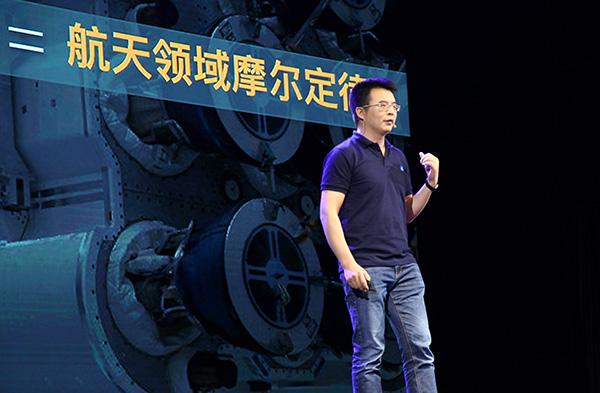Academician Mei Hong: Faced With The AI boom, Technology Ethics Governance Must Keep Up
Academician Mei Hong: Faced With The AI boom, Technology Ethics Governance Must Keep Up
Text|China Science Daily reporter Gao Yali intern reporter Jiang Qingling "Intelligence is a unique feature that distinguishes humans from other animals, especially cognitive ability. We can accept that machines surpass humans in terms of perception ability, but the research and development of machine cognitive intelligence
"Intelligence is a unique feature that distinguishes humans from other animals, especially cognitive ability. We can accept that machines surpass humans in terms of perception, but the research and development of machine cognitive intelligence requires a high degree of caution. From the perspective of technological ethics, why do we create something that replaces our cognition?"
On November 22, at the Second China Science and Technology Ethics Summit Forum with the theme of "Science and Technology Ethics Crossing the Boundaries", Mei Hong, an academician of the Chinese Academy of Sciences and a professor at Peking University, pointed out the ethical challenges facing current digital technology.
From smart manufacturing to smart cities, from medical and healthcare to financial services, the current big language model is booming, and artificial intelligence (AI) is in full swing. Mei Hong believes that in the AI boom, the bubble is too big and is still at the peak of the technological maturity curve. The noise and buzz are burying rationality and require a cooling-off period.
He emphasized that although based on the current technological path, large models cannot "create something out of nothing" and do things that exceed human expectations, blindly believing in "brute force" and pursuing scale is also very easy to develop "big beasts" that people are unable to control in terms of coverage and complexity.
"You can't read valuable content with your phone"
After experiencing two "spring" and two "winters", AI ushered in its third "spring", and the breakthroughs brought by deep learning technology are constantly refreshing people's understanding of AI.
However, from Facebook () data leak to big model generation content causing infringement disputes and false information, while digital technology brings benefits to human social and economic development, it also brings a series of ethical issues such as data privacy protection, algorithm bias, and responsibility recognition.
For example, in terms of the current technical route of large language models, the inexplicability caused by the "black box" is its biggest "scene door". If applied in large quantities without any regulations, it may lead to severe challenges in the human knowledge system. Factors such as quality defects in training corpus, endogenous errors in probability statistics will lead to hallucinations in the big model and generate incorrect content; coupled with human intervention induction, it is very easy to generate false content.
"Through algorithms, the platform can personalize content, but it may also form a user's information cocoon. My biggest trouble recently is that I can't read the valuable content I want to read with my mobile phone." Mei Hong said that at present, almost most network platforms are operated under AI algorithms and big data drives, which brings effective supervision of algorithms and data applications, which need to be solved by establishing a complete governance system. When it comes to cross-border platforms, there is also a corresponding international governance system.
The reality is not satisfactory
At present, society has high expectations for "AI " or "AI for" (everything is artificial intelligence), but the reality is not satisfactory.
"Thunder rumbling, raindrops are not big." Mei Hong admitted, "From the current craze, I have seen too many AI 'overheating' caused by 'hype' and 'irrational', and have also raised some concerns about the lack of diversity in the current AI development technology path."
"The success of the large language model depends on the huge corpus accumulated by humans over a long period of time, and the success of Wensheng Video also depends on the massive videos existing on the Internet. However, the data accumulation in other industries has not yet reached this order. The key to obtaining all data is to cross sufficient time scales." Mei Hong said that the application of AI still needs to go through a period of exploration, running-in and accumulation before it can usher in prosperity.
"In my opinion, there are three current problems with AI: the bubble is too big and is still at the peak of the technological maturity curve. The noise and bury rationality, and a cooling-off period is needed; generalize from a side point, amplify and generalize successfully without regard to the premise, and over-promise; the expectations are too high, users deify the expected effects of AI and put forward difficult-to-achieve needs." Mei Hong said.
Faced with the current situation of AI technology development and its application, Mei Hong suggested that when you are still not sure how to apply it and where to use it, you might as well accumulate data first, "get as much as you can and save as much as you can."
No probability statistics framework
So, can large language models move towards general artificial intelligence? Mei Hong believes that from the basic principle, the current large language model has not broken out of the framework of probability statistics.
Mei Hong does not believe that current AI has the so-called "consciousness" or the ability to emerge from knowledge. Taking the large language model as an example, the model itself cannot produce new things. The content it generates depends on statistics on a large amount of text content. If certain content appears repeatedly, they will most likely regard it as "reasonably existing" content.
"In this sense, large models can be regarded as a knowledge base composed of existing corpus compression. The semantic accuracy of the generated results depends highly on the spatial breadth, temporal depth and distribution density of the data, and more on the quality of the data." He mentioned that academic research should pay more attention to the repeatability and traceability of the big model construction process, and ensure the interpretation and trust of the results as much as possible.
"Bold prediction, as a basic model that compresses most of the publicly accessible knowledge that humans already have, the large language model will move towards open source like the Internet. The whole world jointly maintains an open and shared basic model and tries its best to ensure that it is synchronized with human knowledge." Mei Hong said, "This is at least a kind of expectation to be expressed."
Adjust the review list for ethical review in a timely manner
"The ultimate goal of inventing technology is to make human life better. There is no doubt that the ethical issues that technology may bring should be fully considered." Mei Hong said that under the rapid development of AI, possible risks need to be judged and reminded scientific and technological workers to always keep in mind that technology is good and people-oriented.
With the development of digital technology, the governance of science and technology ethics should also keep up. Mei Hong emphasized that at present, the system and mechanism of scientific and technological ethics governance should be improved, the governance priorities and safety guardrails in the field of digital technology should be clarified, and digital technology should be managed in a hierarchical and classified manner. At the same time, the active disclosure and annotation system for AIGC (general artificial intelligence) should be established and related technical research should be carried out.
So, should there be no research areas in the field of digital technology? Mei Hong believes that there are generally no restrictions in the basic research stage, and research involving the regulation of people's cognitive ability and violation of people's free will should be listed as a forbidden area. In the technology and product application stage, it should be determined based on the specific scenario and impact.
"For example, large-scale remote monitoring, social evaluation systems for independent decision-making, technologies that manipulate individual consciousness and behaviors and cause physical or psychological harm to individuals or others, and AI technology research and development aimed at transcending or replacing people's cognitive abilities should be restricted," said Mei Hong.
At the same time, he said that research restricted areas in the field of digital technology should establish a dynamic adjustment mechanism and adjust the review list of ethical review in a timely manner.
In addition, he called for the establishment of a disclosure standard mechanism for AI-generated content, and the establishment of an annotation responsibility mechanism covering big model developers, creators and users; encourage multiple technical routes to promote the research and development of big model generated content labeling technology; improve the standardization of large model content review system and testing technology development; promote the formulation of relevant standards and specifications and internationalize them.





